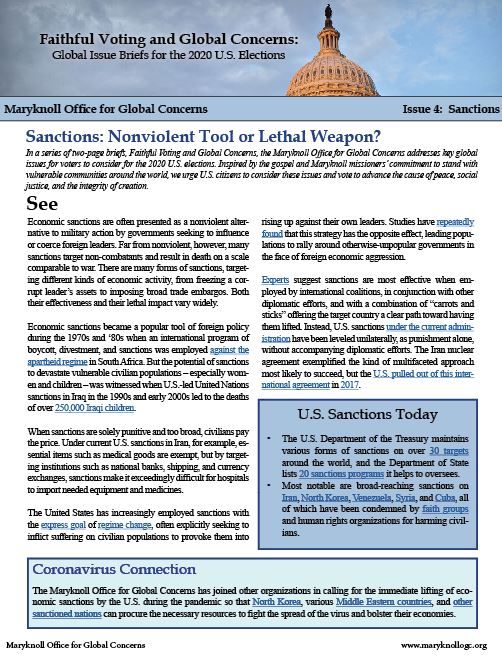Sanctions: Nonviolent Tool or Lethal Weapon?
This is an abbreviated version of the brief on U.S. sanctions policy as part of our election briefs series, Faithful Voting and Global Concerns. View the entire brief here. The following article was published in the July-August 2020 issue of NewsNotes. See Economic sanctions are often presented as a nonviolent alternative to military action by governments seeking…
This is an abbreviated version of the brief on U.S. sanctions policy as part of our election briefs series, Faithful Voting and Global Concerns. View the entire brief here. The following article was published in the July-August 2020 issue of NewsNotes.
See
Economic sanctions are often presented as a nonviolent alternative to military action by governments seeking to influence or coerce foreign leaders. Far from nonviolent, however, many sanctions target non-combatants and result in death on a scale comparable to war. There are many forms of sanctions, targeting different kinds of economic activity, from freezing a corrupt leader’s assets to imposing broad trade embargos. Both their effectiveness and their lethal impact vary widely.
Economic sanctions became a popular tool of foreign policy during the 1970s and ‘80s when an international program of boycott, divestment, and sanctions was employed against the apartheid regime in South Africa. But the potential of sanctions to devastate vulnerable civilian populations – especially women and children – was witnessed when U.S.-led United Nations sanctions in Iraq in the 1990s and early 2000s led to the deaths of over 250,000 Iraqi children.
When sanctions are solely punitive and too broad, civilians pay the price. Under current U.S. sanctions in Iran, for example, essential items such as medical goods are exempt, but by targeting institutions such as national banks, shipping, and currency exchanges, sanctions make it exceedingly difficult for hospitals to import needed equipment and medicines.
The United States has increasingly employed sanctions with the express goal of regime change, often explicitly seeking to inflict suffering on civilian populations to provoke them into rising up against their own leaders. Studies have repeatedly found that this strategy has the opposite effect, leading populations to rally around otherwise-unpopular governments in the face of foreign economic aggression.
Experts suggest sanctions are most effective when employed by international coalitions, in conjunction with other diplomatic efforts, and with a combination of “carrots and sticks” offering the target country a clear path toward having them lifted. Instead, U.S. sanctions under the current administration have been leveled unilaterally, as punishment alone, without accompanying diplomatic efforts. The Iran nuclear agreement exemplified the kind of multifaceted approach most likely to succeed, but the U.S. pulled out of this international agreement in 2017.
Judge
Too often, the use of sanctions violates Catholic values of nonviolence and just peace by failing both to protect the vulnerable and to effectively advance the cause of reconciliation and sustainable peace. Even when employed with legitimate objectives such as halting corruption, human rights violations, or preparations for war, Catholic social teaching requires that sanctions “be used with great discernment and must be subjected to strict legal and ethical criteria.” They should be applied:
- Multilaterally,
- In conjunction with other diplomatic tools and ongoing dialogue,
- With a timetable and clear incentives for positive action,
- And must not result in harm to civilians.
Act
Sanctions are a complicated tool of international relations, taking myriad forms and functioning within a wider framework of diplomatic or military action. We should urge our candidates to commit to taking the following actions:
- Employ sanctions strategically and nonviolently, according to the criteria listed above;
- Listen to the voices of ordinary citizens and those who accompany them on the ground in targeted countries,
- Ease or lift sanctions that threaten civilians either directly or indirectly, especially in response to disasters such as a pandemic.
Faithful Citizenship
Find out the candidates’ records on economic sanctions. Do they support U.S. engagement with other countries to transform conflicts through nonviolent diplomatic means? If a candidate’s position is unclear, reach out to the campaign and ask. Let them know you are concerned about the violence sanctions can inflict on vulnerable communities, get them on the record, and vote for strategic nonviolence and just peace!

